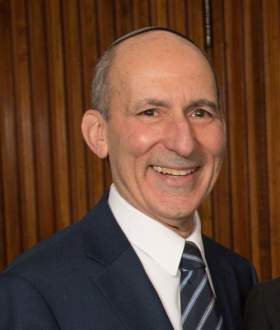
As A New Year Begins
The month before Rosh HaShanah through Yom Kippur is, traditionally, a time of personal and collective reflection. The recent pandemic was, surely, a reminder that there are matters beyond our control. There is, nonetheless, a great deal over which we exercise control, including our responses to the uncontrollables in our life.
The pandemic underscored another reality: that humankind is inextricably intertwined. Within the human community of eight billion people, Jews number approximately sixteen million (0.2%). Yet, with roots in its foundational text, the Torah, the Jewish people has maintained an abiding sense of responsibility for the world of which we are a part.
The recent 60-year commemoration of Martin Luther King’s “I have a Dream” speech in the nation’s capital, reminded me of the following, personal experience recorded by Stephen Carter, a professor at Yale Law School, in his book Civility. Carter, an African American, recalls moving with his family to a white neighborhood in the D.C. area, in the 1960s. Sitting outside with his siblings, shortly after the move, Stephen felt ignored and unwelcomed. “I knew we were not welcome here. I knew we would not be liked here. I knew we would have no friends here.”
Suddenly, a woman returning home from work smiled at the children and exclaimed: “Welcome!” She went into her house and soon reappeared bearing a tray laden with drinks and cream cheese and jelly sandwiches for the young Carters. Carter writes that the woman’s name was Sara Kestenbaum; Sara was a religious Jew. In Jewish tradition, he continues, such acts of kindness are called hesed. In that encounter, Carter concludes, “I discovered how a single act of genuine and unassuming civility can change a life forever.”
The call of this season is to align our conduct, guided by the teachings of Torah in its broadest sense, with our best understanding of what is just and right. Early on (Genesis 18:19) the Torah relates that Abraham was singled out to instruct his children and his posterity to do precisely that: la’asot tzedakah u’mishpat – to do what is just and right. The covenant that is at the heart of the Book of Exodus is about a people collectively committed to acting on this model. Though the covenant of Sinai is particularistic, the vision it represents and the acts it encourages extend to all humankind; the Jewish covenant has a universal mission.
In a remarkable statement in the Jerusalem Talmud, God is quoted as declaring: “If only they had abandoned Me, but kept My Torah” (Jerusalem Talmud, Hagigah 1:7). In other words, right conduct, as prescribed by the Torah, is paramount. Starting with the Torah and to the present day, Judaism has been action-oriented. As the late Rabbi Harold Schulweis wrote: “Godliness is behaved.”
David Wolpe comments that “what we do in this world is the real measure of any life.” This period of year reminds us that there are many choices in our lives that we can and do make. The opportunity is ours to measure up to our highest ideals. To paraphrase the High Holiday liturgy, may we, bound together as one, with undivided heart, strive to behave in Godly fashion, knowing – in the words of John F. Kennedy – “that here on earth, God’s work must truly be our own.”

